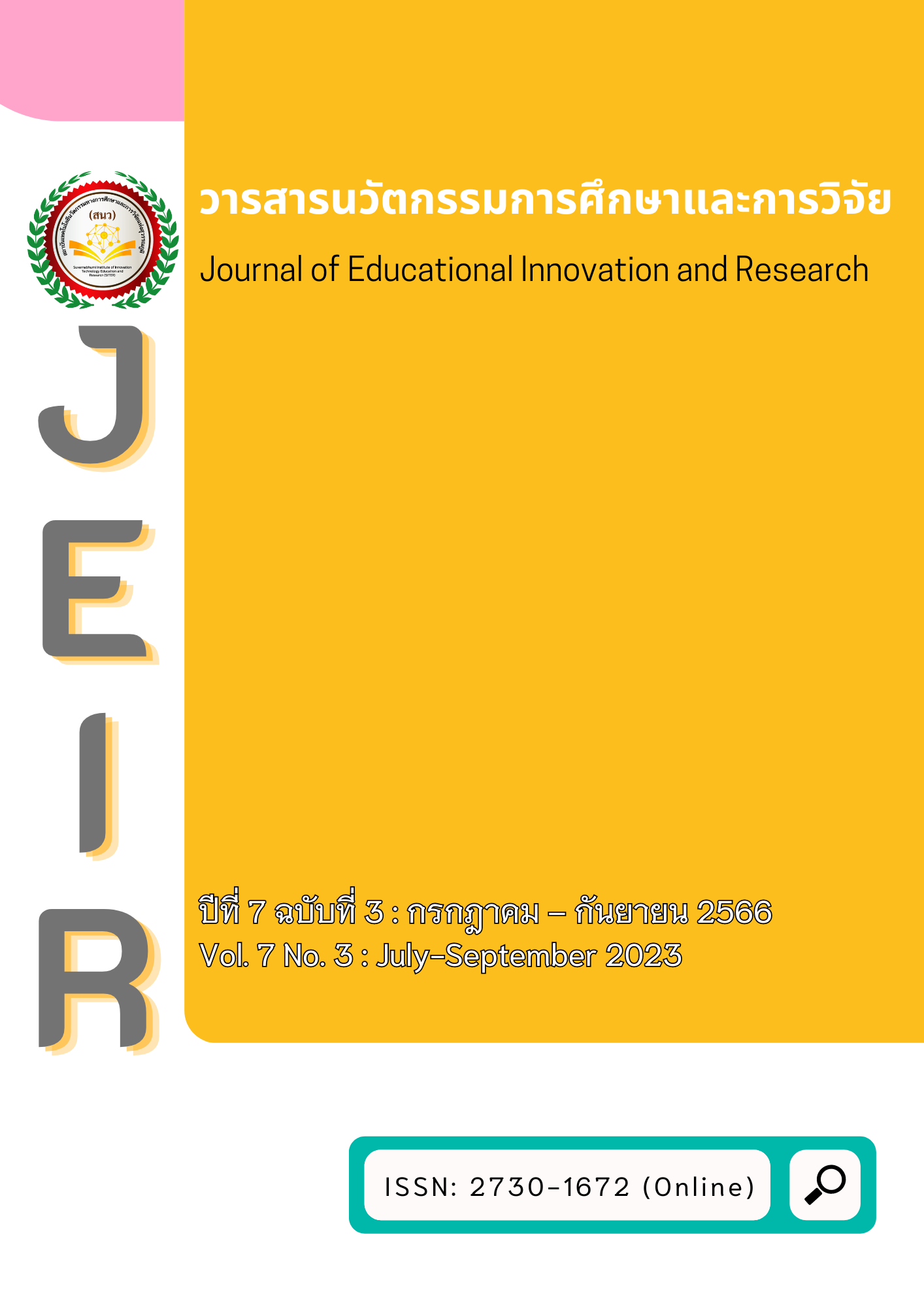การพัฒนาสมรรถนะของผู้บริหารระดับต้นในอุตสาหกรรม เทคโนโลยีสารสนเทศ
Main Article Content
บทคัดย่อ
การวิจัยครั้งนี้มีวัตถุประสงค์เพื่อศึกษา 1) สภาพปัจจุบัน ปัญหา และการพัฒนาสมรรถนะของผู้บริหารระดับต้นในอุตสาหกรรมเทคโนโลยีสารสนเทศ และ 2) ปัจจัยที่ส่งผลต่อสมรรถนะของผู้บริหารระดับต้นในอุตสาหกรรมเทคโนโลยีสารสนเทศ โดยใช้วิธีดำเนินการวิจัยแบบผสม ประกอบด้วย การวิจัยเชิงคุณภาพโดยทำการสัมภาษณ์เชิงลึกกับผู้ให้ข้อมูลสำคัญ จำนวน 18 คน
และทำการวิเคราะห์เนื้อหา ในการวิจัยเชิงปริมาณเก็บข้อมูลกับกลุ่มตัวอย่าง คือ อุตสาหกรรมเทคโนโลยีสารสนเทศในกรุงเทพมหานครและปริมณฑล จำนวน 380 องค์การ โดยใช้แบบสอบถามสอบถามเป็นเครื่องมือในการวิจัย และวิเคราะห์ข้อมูลโดยหาค่าร้อยละ ค่าเฉลี่ย ส่วนเบี่ยงเบนมาตรฐาน การทดสอบค่าที การทดสอบค่าเอฟ และการวิเคราะห์ถดถอยแบบพหุคูณ
ผลการวิจัยพบว่า 1) สภาพปัจจุบันของอุตสาหกรรมเทคโนโลยีสารสนเทศมีการเติบโตอย่างรวดเร็วตามพลวัตรการเปลี่ยนแปลงของเทคโนโลยีสารสนเทศ มีปัญหาสมรรถนะเกี่ยวกับงานที่ไม่ทันต่อการเปลี่ยนแปลง มีความล่าช้าในการปรับตัว มีปัญหาทักษะการบริหารคน การสื่อสารและจูงใจทีมงาน 2) ปัจจัยการพัฒนาทรัพยากรมนุษย์ส่งผลต่อสมรรถนะผู้บริหารระดับต้นในอุตสาหกรรมเทคโนโลยีสารสนเทศ อย่างมีนัยสำคัญทางสถิติที่ระดับ .01 และ .05 ดังนั้น การพัฒนาสมรรถนะผู้บริหารระดับต้นในอุตสาหกรรมเทคโนโลยีสารสนเทศ ควรเริ่มจากการพัฒนาบุคลากรด้านการสอนในสถาบันการศึกษาให้มุ่งมั่นผลิตนักศึกษาให้มีความรู้เท่าทันการเปลี่ยนแปลงของเทคโนโลยีสารสนเทศ ประสานงานกับภาคอุตสาหกรรมเพื่อผลิตบุคลากรให้ตรงกับความต้องการ การพัฒนาให้ทันต่อการเปลี่ยนแปลงของเทคโนโลยีสารสนเทศจะต้องใช้วิธีการฝึก การสอนงาน และการฝึกอบรม
Article Details

อนุญาตภายใต้เงื่อนไข Creative Commons Attribution-NonCommercial-NoDerivatives 4.0 International License.
เอกสารอ้างอิง
Blanchard, P. N. & Thacker, J. W. (2013). Effective Training Systems Strategies and Practices. (5th ed.). England: Pearson Education Limited.
Chalofsky, N. (1992). A unifying definition for the human resource development professional. Human Resource Development, Quaterly, 3(2), 175–182.
Chuchartpong, T. (2018). The Identification of a Competency for Programmers at Fusion Solution Company Limited. MUT Journal of Business Administration, 15(2), 72-88.
Chucherd, S. (2021). The Development of Personnel Competency in Working More Efficiency. Valaya Alongkorn Review (Humanites and Social Science), 12(1), 223-238.
Connor, O. B. (2011). A Report of the International ICT Literacy Panel, Digital Transformation:a Framework for ICT Literacy. U.S.A.: Educational Testing service (ETS).
Dales, M. & Hes, K. (1995). Creating Training Miracles. Sydney, Australia: Prentice-Hall.
Doyle, A. (2021). Information and Communications Technology (ICT). The Balance Careers.
Dubois,D. & Rothwell, W.J. (2004). Competency–Based Human Resource Management. California: Davies-Black Publishing.
Eggland, S. A. & Maycunich, A. M. (2002). Principles of human resource development. (2nd ed.) Cambridge: Perseus.
Kaewkhao, S. (2018). Factors Influencing Human Resource Development of Department of Agricultural Extension, Ministry of Agriculture and Cooperatives. Journal of Thonburi University, 12(27), 111-121.
Jaropoom, A. (2016). A Study of Information Technology Competency for Government Readiness on Dojital Economy: Case Study at Information and Communication Technology Centre-Office of the Permanent Secretaty, Ministry of Finance (An Independent Study for the Degree of Master of Political Science). Thammasat University.
Marsick, V. J., & Watkins, K. E. (1994). Facilitating Learning in Organization: Making Learning Count. United Kingdom: Gower Publishing.
McClelland, D. C. (1993). Intelligence is not the best predictor of job performance. Current Directions in Psychological Science, 2(1), 5–6.
Mintzberg, H. (1994). The Structuring of Organizations. Englewood Cliff, New Jersey: Printice-Hall.
Nuzrath, M. (2012). Business Skills for E-Commerce. Retrieved August 26, 2021, from http://www.isguk.org/courses-docs/Business%20Skills%20for%20E-commerce.pdf
Ozcelik, G.; & Ferman, M. (2006). Competency Approach to Human Resource Management: Outcomes and Contributions in a Turkish Cultural Context. Human Resource Development Review, 5(72), 72-91.
Phuwittayaphan, A. (2014). Competency Dictionary. Bangkok: HR Center.
Rojanasang, C. (2012). Human Resource Management of Information Organization (2nded.). Nonthaburi: Sukhothai Thammathirat University.
Sangthong, N. (2017). Let’s get to know competency. Bangkok: HR Center.
Sirkemaa, S. J. (2010). Critical Skills and Knowledge in Development of e-commerce Infrastructure. Retrieved August 26, 2021, from http://www.internetjournals.net/journals/tir/2005/Jaunary/ Paper10.pdf.
Swanson, R. A. & Holton, E. F. (2009). Foundations of Human Resource Development (2nd ed.). San Francisco: Barrett-Koehler Publishers, Inc.
The Thai Chamber of Commerce. (2021). Industry Conditions IT. Retrieved August 26, 2021, from https://www.thaichamber.org/
Ukrathitipong, J. (2013). Human Resource Development. Phranakhon Si Ayutthaya: Phranakhon Si Ayutthaya Rajabhat University.
Wutthirong, P. (2016). Human Resource Management in the Next Decade. Bangkok: Chulalongkorn University.


